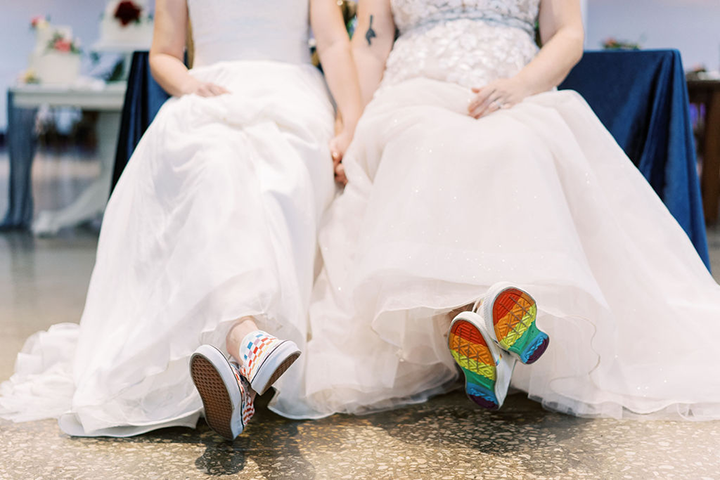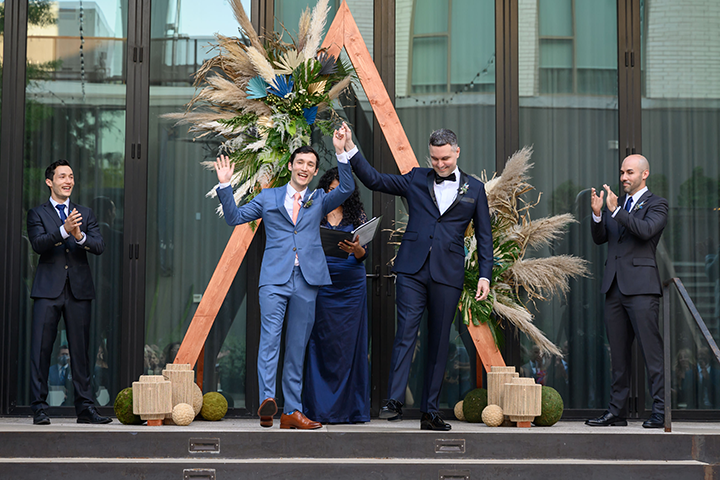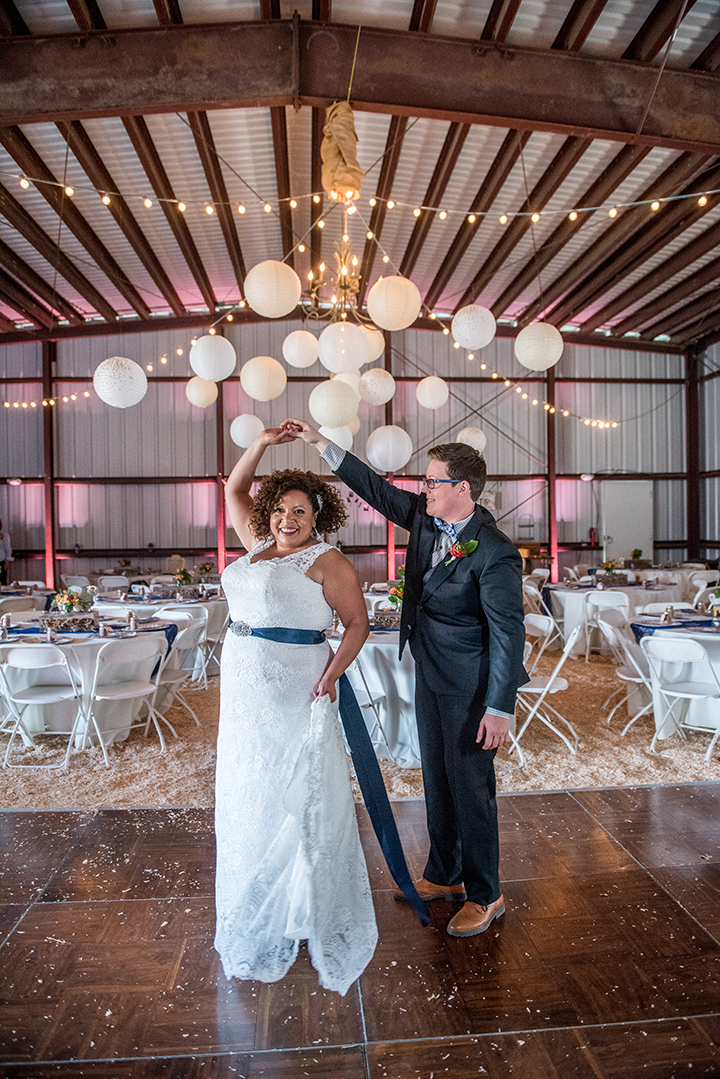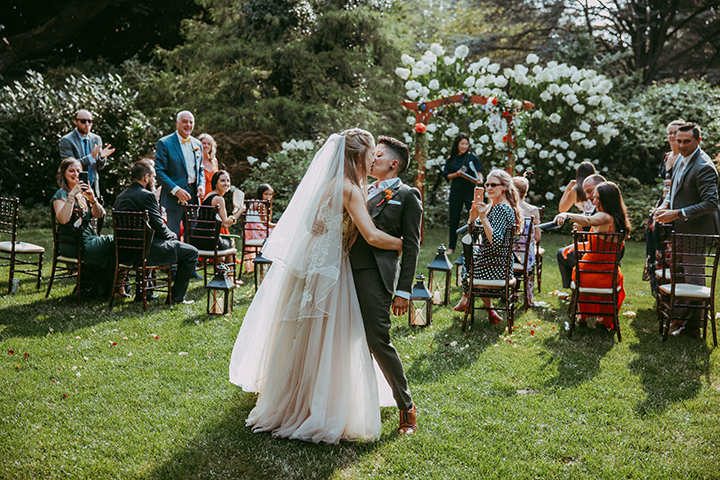It has been seven years since Obergefell v. Hodges granted the freedom to marry to all Americans, yet inclusivity gaps remain throughout the wedding and event industry. From using incorrect pronouns to following heteronormative values, most slights are rooted in ignorance rather than malice.
Regardless of intention, an industry built on love but lagging in equality efforts remains a place that feels unwelcoming and exclusionary to the LGBTQ+ community.

Photo courtesy Renee Lemaire Photography
Ignorance is no longer an excuse. It’s time for all event businesses to do the work and practice inclusivity—not just with lip service but with action. Go past the rainbow filter in June and build a brand that is truly equality-minded.
Here’s how to do just that.
Learn, then apply.
Just as education supports learning new skills, it’s also how you can better understand how to show up for the people around you. Many LGBTQ+ industry pros agree that education is the first place to start for authentic inclusivity.
“Take the time and put in the work to educate yourself regarding LGBTQ issues and the LGBTQ experience,” encourages Don Mamone, identity coach and diversity consultant for The Mamones. Then, “make decisions for your business, associations, and industry with a focus on Diversity, Inclusion, Equality and representation so that leadership expands from within.”
Allyship relies on understanding and empathy, as Mary Jane Guerra of From Engaged to Married notes, “Constant education is a must in our line of work. Therefore, we respectfully ask questions and research ways to be better allies.”

Photo courtesy Jenny DeMarco
But asking questions isn’t enough to get a full picture, as explained by Cindy Savage, owner of Aisle Less Traveled. “Several LGBTQ+ folks within the wedding industry offer certification programs, inclusivity reviews, seminars, and other resources to help you and your company truly become inclusive,” she says. “This is what we need most—not just for ourselves, but for our clients.”
Build an inclusive referral list.
Referrals are worth their weight in gold, especially for those in marginalized communities who often face discrimination in their businesses. So Mary Angelini, founder of Key Moment Films, recommends “mak[ing] a list of active allies or LGBTQ+ vendors you know will serve your queer clients with grace and expertise.”
Not only does this serve fellow industry pros, but it will also mean the world to LGBTQ+ clients to know you’ve done the work to curate an inclusive list of creative partners. If you already have a preferred vendor list, Angelini says it’s time to revisit it.
“The company you keep tells of who you are more than any words you say,” she asserts. “Vetting your vendor list only to include vendors who believe in equality for all and have experience in the niche will benefit the clients and show support and allyship to fellow like-minded vendors.”
Showcase inclusivity.
LGBTQ+ folks may feel wary about opening up about their identity to potential vendors or even industry peers, so make it obvious to anyone that you’re equality-minded.
“The best way to support LGBTQ+ clients in the event industry is to make it VERY clear on all of your social media and your marketing materials that you are LGBTQ+ friendly!” Cathy O’Connell of COJ Events and Inclusive Wedding Planning says. “They don't have to ask if you can support their wedding—they will already know! This is a huge level of support and acknowledgment for engaged LGBTQ+ couples.”

Photo courtesy Classic Photographers
Kristin Wilson of Our DJ Rocks suggests, “if you have a blog or wedding highlights section, include LGBTQ+ weddings that you’ve done! Some couples have a hard time envisioning their own wedding if all they see everywhere are traditional cisgender, straight couples, so highlighting all of the different clients you work with can make their decisions easier.”
And beyond your own content, use your channels to lift up LGBTQ+ voices that are often quieted. Angelini elaborates, asking event pros to “amplify the voices of others who are posting about important issues. Repost (and tag) vendors using their platform to inform and support the LGBTQ+ community. This sends a message to all that you support that vendor and support the LGBTQ+ community at large. The additional engagement will also bump their content to more like-minded viewers.”
Refine your language.
The words you use tell others what to expect from your business, so audit how you communicate with prospects, clients, and other vendors and be more mindful of your language and how it influences those around you.
“Make sure all of your communication throughout the entire client experience is gender-neutral,” says Maureen Cotton, coach and officiant for The Soulful Wedding. “So many vendors have made an effort to have gender-neutral marketing, but they forget about the post-booking experience.”
Cotton continues, noting, “For a queer client to face heteronormative language and assumptions after booking can feel like a bait and switch. Make sure every email, form, and service label—right down to post-event follow-up—refers to the couple, soonlywed, marrier, partner, etc. There are so many options beyond ‘bride and groom!’”
Avoid making assumptions.
An incorrect assumption with an LGBTQ+ client or colleague risks more than an awkward faux pas; it can cause the other person to feel uncomfortable, unseen, and even unwelcomed. So forget what you think you know and let others tell you instead.
“Do not assume that you know anyone’s gender, pronouns, sexual orientation, title/role within the scope of the event, or what their needs are,” Savage states. “Instead, ask many open-ended questions that allow clients to share about themselves.”
Likewise, “do not assume that traditional weddings with attendants are not in the picture,” adds Anita Peters of Mark This Day With Love. “LGBTQ couples are interested in having a wedding day that is meaningful to them, and that may just be a traditional wedding with couples processing with parents and having wedding attendants.”
Mistakes are an inevitable part of the learning process, so don’t think a wrong assumption is the end of the world. Instead, communicate openly about it and explain what you’re doing to ensure it doesn’t happen again.
O’Connell shares, “I'm an LGBTQ+ wedding planner, and I still sometimes get it wrong with pronouns and expectations. Don't feel embarrassed asking your couples what they want and how they feel. That will truly help them feel that you care about them and their celebration of love!”
Ask for pronouns.
One of the most commonly made assumptions? Pronouns. “For transgender and non-binary folks, being referred to with the wrong pronouns is a constant,” Savage says.

Photo courtesy Savannah Brown Photography
Savage continues, adding, “You can be a gender-affirming person to your clients by asking for and using their correct pronouns and sharing your own pronouns—in your email signature, on your website, and in person as part of introducing yourself. If you haven’t spent much time using they/them pronouns, it’s critically important that you practice before you work with LGBTQ+ clients so that you are confident and comfortable using them when the time comes.”
Another pro tip: Skip the term “preferred pronouns.” A preference indicates that there are other options, which there are not—they are simply pronouns.
Put privacy first.
Be mindful that every person in the LGBTQ+ community is at different stages in their journey. Some are out and proud; others are still figuring out how to live as their most authentic selves. So in working with clients and colleagues, remember that their privacy protects more than personal information—it protects their identity.
“Remember never to disclose their personal information; ask about whether or not they are comfortable posting photos on your social media,” reminds Monika Kreinberg, president of Furever Us. “Also, never reveal your client's sexual orientation or gender identity without having the person's permission first.”
Needless to say, the same goes with LGBTQ+ peers as well. “It is never the job of a straight ally to out a fellow vendor, nor is it ever helpful to pigeonhole or stereotype them,” adds Meagan Culkin of Magnolia Collective. “Be sure to take the time to get to know them outside of work, what they choose to share with clients vs. what they choose to keep private, and be respectful of those boundaries.”
Diversity and inclusion is not a buzzword. Rather, it’s a core value that event professionals must embody in every aspect of their business—from marketing copy and sales scripts to onboarding docs and planning meetings. Educate, evaluate, and embrace equality-mindedness to foster a company culture that invites all to the table.



